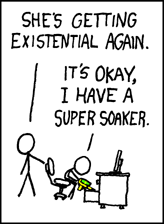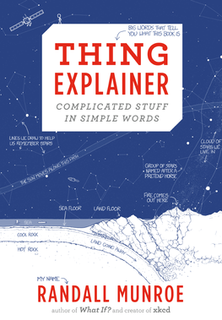
Judith Martin, better known by the pen name Miss Manners, is an American columnist, author, and etiquette authority.
Marilyn vos Savant is an American magazine columnist who has the highest recorded intelligence quotient (IQ) in the Guinness Book of Records, a competitive category the publication has since retired. Since 1986, she has written "Ask Marilyn", a Parade magazine Sunday column wherein she solves puzzles and answers questions on various subjects, and which popularised the Monty Hall problem in 1990.
In physics or engineering education, a Fermi problem, Fermi quiz, Fermi question, Fermi estimate, order-of-magnitude problem, order-of-magnitude estimate, or order estimation is an estimation problem designed to teach dimensional analysis or approximation of extreme scientific calculations, and such a problem is usually a back-of-the-envelope calculation. The estimation technique is named after physicist Enrico Fermi as he was known for his ability to make good approximate calculations with little or no actual data. Fermi problems typically involve making justified guesses about quantities and their variance or lower and upper bounds. In some cases, order-of-magnitude estimates can also be derived using dimensional analysis.
Ghost is a written or spoken word game in which players take turns adding letters to a growing word fragment, trying not to be the one to complete a valid word. Each fragment must be the beginning of an actual word, and usually some minimum is set on the length of a word that counts, such as three or four letters. The player who completes a word loses the round and earns a "letter", with players being eliminated when they have been given all five letters of the word "ghost".

Yakov Isidorovich Perelman was a Russian and Soviet science writer and author of many popular science books, including Physics Can Be Fun and Mathematics Can Be Fun.

An advice column is a column in a question and answer format. Typically, a reader writes to the media outlet with a problem in the form of a question, and the media outlet provides an answer or response.

A scavenger hunt is a game in which the organizers prepare a list defining specific items, which the participants seek to gather or complete all items on the list, usually without purchasing them. Usually participants work in small teams, although the rules may allow individuals to participate. The goal is to be the first to complete the list or to complete the most items on that list. In variations of the game, players take photographs of listed items or be challenged to complete the tasks on the list in the most creative manner. A treasure hunt is another name for the game, but it may involve following a series of clues to find objects or a single prize in a particular order.
Text types in literature form the basic styles of writing. Factual texts merely seek to inform, whereas literary texts seek to entertain or otherwise engage the reader by using creative language and imagery. There are many aspects to literary writing, and many ways to analyse it, but four basic categories are descriptive, narrative, expository, and argumentative.

Randall Patrick Munroe is an American cartoonist, author, and engineer best known as the creator of the webcomic xkcd. Munroe has worked full-time on the comic since late 2006. In addition to publishing a book of the webcomic's strips, he has written four books: What If?, Thing Explainer, How To, and What If? 2.

xkcd, sometimes styled XKCD, is a webcomic created in 2005 by American author Randall Munroe. The comic's tagline describes it as "a webcomic of romance, sarcasm, math, and language". Munroe states on the comic's website that the name of the comic is not an initialism but "just a word with no phonetic pronunciation".
D. B. Cooper is a media epithet used to describe an unidentified man who hijacked a Boeing 727 on November 24, 1971, extorted a US$200,000 ransom, and parachuted to an unknown fate. He was never seen again, and only $5,880 of the ransom money has been found. The incident continues to influence popular culture, and has inspired references in books, film, and music.

ROFLCon was a biennial convention of internet memes that took place in 2008, 2010 and 2012, featuring various internet celebrities. All three events were at the Massachusetts Institute of Technology. ROFLCon was first organized by a group of students from Harvard University led by Tim Hwang. According to Hwang, the inspiration for the conference was the September 23, 2007 meetup of fans of xkcd with its creator, Randall Munroe, in a park in North Cambridge, Massachusetts.
Breadpig, stylized as breadpig, is a company that produces a variety of items that appeal to geeks, most notably publishing the book xkcd: volume 0.

What If?: Serious Scientific Answers to Absurd Hypothetical Questions is a 2014 non-fiction book by Randall Munroe in which the author answers hypothetical science questions sent to him by readers of his webcomic, xkcd. The book contains a selection of questions and answers originally published on his blog What If?, along with several new ones. The book is divided into several dozen chapters, most of which are devoted to answering a unique question. What If? was released on September 2, 2014 and was received positively by critics. A sequel to the book, titled What If? 2, was released on September 13th, 2022.

Thing Explainer: Complicated Stuff in Simple Words is a 2015 illustrated non-fiction book created by Randall Munroe, in which the author attempts to explain various complex subjects using only the 1,000 most common English words. Munroe conceptualized the book in 2012, when drawing a schematic of the Saturn V rocket for his webcomic xkcd. Published by Houghton Mifflin Harcourt, material from Thing Explainer has been incorporated in United States high school textbooks.
"[Citation needed]" is a tag added by Wikipedia editors to unsourced statements in articles requesting citations to be added. The phrase is reflective of the policies of verifiability and no original research on Wikipedia and has become a general Internet meme. On the English Wikipedia, the display effect looks like this:
Gretchen McCulloch is a Canadian linguist. On her blog, as well as her podcast Lingthusiasm she offers linguistic analysis of online communication such as internet memes, emoji and instant messaging. She writes regularly for Wired and previously did so for The Toast. In 2019, she published a book on internet linguistics, Because Internet: Understanding the New Rules of Language.
A how-to is a description of how to do something. It may also refer to:

Beyond Order: 12 More Rules for Life is a 2021 self-help book by Canadian clinical psychologist, YouTube personality, and psychology professor Jordan Peterson, as a sequel to his 2018 book 12 Rules for Life. Beyond Order was released on 2 March 2021.
Nerd sniping is a slang term for the action of giving an interesting problem to a person.










